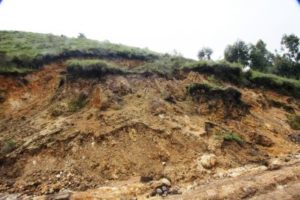The Anglophone Crisis, which has degenerated into an arm-conflict, has forced many people out of their settlements into bushes and other areas some of which are prone to natural hazards, especially with the increasing downpour.

This status quo has become worrisome to the South West Regional Delegation of Scientific Research and Innovation, MINRESI, which has worked over the course of time with universities and NGOs, to establish hazard-prone areas in the Region.“When hazards occur, they may have greater impacts on the riparian population than they would have had if the conflict did not force people to relocate to hazardous area. Take a place like Lebialem, where people have left their normal settlements and fled into the bushes, we don’t know what is happening there. Some of these areas are very susceptible to landslides. We may have casualties that we are not aware of,” the South WestRegional Delegate of Scientific Research and Innovation Dr.George Mafany Teke, divulged in an interview, July 11, 2019.
Though a comprehensive map on disaster-prone zones in the Region is yet to be established, the MINRESI South West boss cited the Lebialem Area, Mount Cameroon Area including Limbe and Rumpi Hills in the Ndian as some of the hazard-prone areas in the Region.
Apart from forcing people to settle in hazard-prone zones, some researchers have been forced to retreat from routine research work as a result of the Crisis. “When violence was rife in Ekona, most of the experimental farms and even the laboratories and offices of the Institute of Agricultural Research for Development, IRAD, in Ekona were abandoned. The same thing happened in IRAD Barombi Kang, Kumba, IRAD Mamfe and IRAD Mundemba. We have the Volcano Observatory of the Institute of Geological and Mining Research whose mission is to monitor the volcano-related activity of the Mount Cameroon Volcano. This structure is located in Ekona. Besides the signals that are recorded at the base station in Ekona, work requires that frequent field trips be made to the field stations for data collection and equipment servicing and maintenance. All of these activities have stopped. The violence impedes scientists from going to the base and field stations to collect data, so we don’t even know what is currently happening with the mountain,” he revealed.
The South West Research boss revealed that because of the Crisis, the ability of researchers to carry out experiments and write scientific papers for publication has been greatly undermined. Experimental projects like The Standardization of Gari Production, the domestication of Non-Timber Forest Products, and other field and laboratory experiments can’t continue because of “the interplay between research and the conflict”.
Meanwhile, research activities have been mostly limited to desk study. “Where we cannot go to the field, we reduce activities to desk study to keep ourselves abreast with what is happening. We have tried to redeploy staff to less violent areas. We desire to see things return to normal so we can continue with the research we are doing for the good of the population,” he stated.
The Delegate noted that the mandate of MINRESI is to execute Government’s policy on research. “Besides publishing our research results in scientific journals, we, through the Minister of Scientific Research make these results available to other stakeholder Ministries for exploitation. For example, research on natural hazards is mostly made available to the Ministry of Territorial Administration since it hosts the Department of Civil Defense that is in charge of disaster prevention and management. The aspect of Management is the prerogative of the Minister of Territorial Administration and not MINRESI,” he noted.
By Ndimuh B. Shancho







